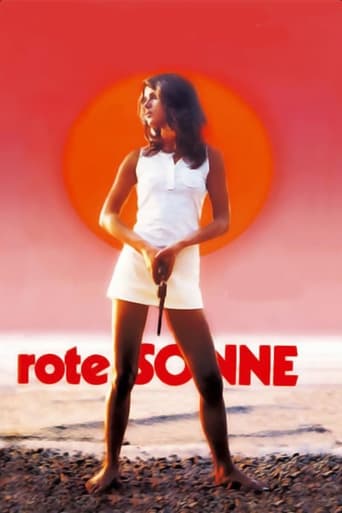radiobirdma
There's a long, stringent thread in German art movie tradition: the much-heralded "social relevance" almost always serves as an excuse for brainless ennui. Rudolf Thome's Rote Sonne, enthusiastically hailed in 1970 by Wim Wenders as the future of the so-called Autorenfilm, makes no difference. Slurring slacker Marquard Bohm moves like a grubby sleepwalker through the spartanly furnished rooms of a flat in Munich his girlfriend (astoundingly bland: Uschi Obermaier, anyway good enough for Jimi Hendrix when he was totally doped in 1968) shares with three other gals out to pick a bloody bone with dudes. Unfortunately the hausfrauen fatales never take action; instead, you get witless blather without end, certainly no story – we're in a German movie here, already forgotten? –, zero erotic ambiance, the monotonous repetition of Albinoni's Adagio in C minor, and the zombie-esque performances of the participants that Wenders tried to sell with the following: "The actors are just boldly present in the scenes, talking and acting as if they do not know what's next ..." Well observed, Wim! The shootout at Lake Starnberg – noticeably an homage to Vidor's Duel in the Sun – might be the most amateurish piece of crap Jesús Franco never dared to put in front of a lens, but an even bigger letdown are the 4.99 Deutsche Mark H&M synthetic skirts of the overwhelmingly unsexy chicks. Before you object: The Swedish clothing retailer was founded in 1947.
Karl Self
This is a dated movie that you have to take in its historical context. A bunch of free-wheeling hippie girls share a flat, a carefree attitude to sex, and a shocking disregard for the physical integrity of their big-spending boyfriends, whom they have communally decided to off after a few days of TLC. This attitude of breaking with conventions, political ideology, availability and excessive violence describes the Zeitgeist of the late 1960ies and early 1970ies very accurately.The balance is offset when an old boyfriend arrives on the scene. As he describes himself bluntly: "I've got this washed-out charme that's irresistible". He is a memorable and unique character, a freeloader, strangely hideous like a Mick Jagger stand-in and immature, and still captivating. When gang leader Peggy (played surprisingly well by the iconic Uschi Obermaier, who was actually more of a "media personality" than an actress) hesitates to comply with the group's five-day-rule she offsets the carefully balanced group dynamics. The movie finishes with a memorable showdown on beautiful lake Starnberg: "Are you hit?" -- "Just in the lung. No biggie." ("Du, nur'n kleiner Lungendurchschuss.")The movie could have been better if there had been a few, homeopathically dosed scenes of ultragraphic violence. And as much as I liked the Thomas character (the movie is worth seeing for him alone), actor Marquard Bohm slurs his lines really badly.But those are minor grievances, Rote Sonne is a bold, outstanding dystopic movie.
suchenwi
This German movie was made in 1969 Munich, and it does not pretend to be anywhere or anytime else. Yet it offers a kind of feminist "science-fiction" which still appears unreal some 38 years later: women are fully self-conscious, they may deal with men, but shoot them about five days later.Thomas (Marquard Bohm) arrives at a women four-some, knowing Peggy (Uschi Obermaier) from earlier in Hamburg, and moves in to their place. Slowly getting to know the women and finding out about the ongoings, he ends in a grand shoot-out together with Peggy.Uschi Obermaier was a major sex symbol and "super-groupie" of the German 1968 generation. In her movie contract it was stipulated that her friend Rainer Langhans (one of the prime movers of Kommune 1 in Berlin) be present at the set at all times, a four-day working week, and paid flights Munich - Berlin and back every week for the two.When you watch this film, try to empathize the times back then, which were very different from now. Also consider that this film totally omits the police/state/government aspect: several shootings occur, and are reported in the tabloid news, but no investigation happens. This "thriller" is mostly about female-male relationships and conflicts in those times, and it sure gave me food for thought. The tragic ending cuts the story a bit too short, in my opinion. But the imagery, of Starnberg Lake and its surroundings, made a very strong impact on me.And there's so much flair of the times - fashions, haircuts, music, the cars... A Volkswagen Beetle plays an almost major role (very different from Love Bug though), and black Mercedes taxis also have two memorable scenes (especially when three meet). I admit that this movie was, and today still is odd (i.e. unconventional), but it fascinated me. I'll watch it again. And for history: the long-haired student who claims that "weather may be changed if needed" (what's happening now, BTW?) was Hark Bohm (Marquard Bohm's brother) in his first role, who later grew to much greater fame in German cinema.
Alex Klotz
This movie is very funny indeed. Maybe it's an attempt at film noir with feministic background that has gone terribly wrong. Maybe the comic elements have been intended. Maybe it's a political statement with nods to Godard. The plot depicts a group of young woman that decide to kill their boyfriends if they insist on a relationship lasting longer than five days. Actually it's pretty entertaining, although all characters are talking and acting in a VERY weird way, resulting in some german reference books calling it a science fiction-movie set in the future, although there are no hints in the plot that justify such an assumption. Anyway, the guy who wrote the dialogue MUST have been on drugs: "If the condition to change society is a change of the weather, then we have to change the weather. This is not impossible." You get the idea, although this may have been a very bad translation.

